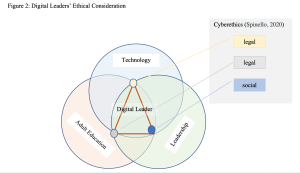Be(come) An Ethical Digital Leader
To be(come) a competent ethical leader, digital leaders need to have the knowledge and skills to combat concerns and issues related to cyberethics. But investigating cyberethics issues solely in the context of technology is not enough. Instead, we need to situate issues concerning cyberethics at the intersection of technology, adult learning, and leadership, as shown in Figure 2.

Using technology to transform an organization to digital, it seems to be intuitive for digital leaders to examine cyberethics issues through the lens of technology. But if we agree with Martin Heidegger that “the essence of technology is by no means anything technological” (1977, p. 4), we should approach our use of technology as “a way of revealing” the truth (Heidegger, 1977, p.12). The truth of leading organizational Dx is to make the organization and employees as successful as they can be and, at the same time, produce social good. If any of the cyberethics issues Spinello identified in his definition for cyberethics (2020) arise from the organizational Dx we lead, Figure 2 could be a good a framework to begin with to reveal the truths behind the issues. Example prompt questions may include: How do we look at tracking employees and keeping their activities under surveillance when they work from home or in their offices? How do we look at the fact that technology automation may deskill skilled employees? Where does employees’ mental well-being fit in our organization’s Dx blueprint? What if the proposed Dx work to the benefit of the organization but not to the community and the society at large? What if the proposed Dx work to the benefit of the organization but not to individual employees?
Therefore, the analysis of a digital leader’s ethical responsibility is truly a social consideration that goes beyond technological specifications. The analysis needs to be situated in the triple-net context (technology, adult learning, and leadership) in which they lead organizational Dx. Different organizations have different needs for different types of technologies. It is critically important for digital leaders to have a thorough understanding of the ethical and moral implications of the Dx they lead and find the right technology to help reveal the truth to the world.

